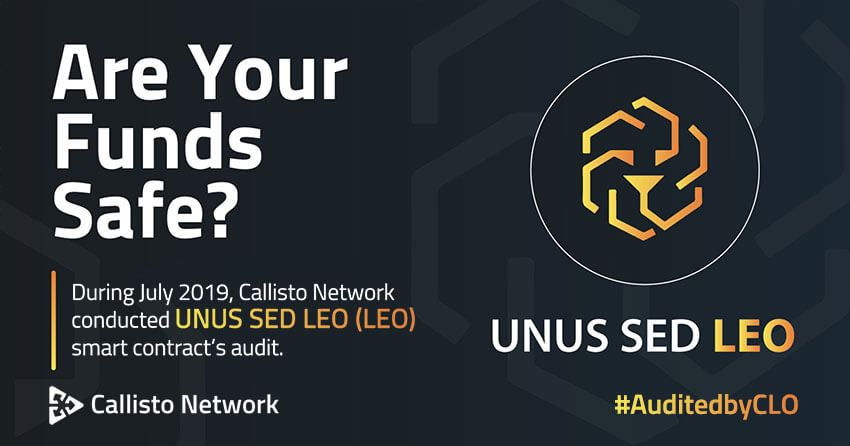Unus Sed Leo Token (LEO) security audit, conducted by the Callisto Network Security Department in July 2019.
Unus Sed Leo (LEO) Specificities
Audit Request
Audit Top 200 CoinMarketCap tokens.
UNUS SED LEO (LEO).
Source Code:
-
https://etherscan.io/address/0x2af5d2ad76741191d15dfe7bf6ac92d4bd912ca3#code (LEO token).
-
https://etherscan.io/address/0xf17ebb3a24dc6d6b56d38adf0df499c1cd9e5672#code (Current token contract controller).
Disclosure policy:
Public.
Platform:
ETH.
Number of lines:
339.
Unus Sed Leo (LEO) Smart Contract Security Audit Report
Are Your Funds Safe?
1. In scope
- https://etherscan.io/address/0x2af5d2ad76741191d15dfe7bf6ac92d4bd912ca3#code (LEO token contract).
- https://etherscan.io/address/0xf17ebb3a24dc6d6b56d38adf0df499c1cd9e5672#code (LEO token contract controller at the moment of the security audit).
2. Findings
In total, 7 issues were reported including:
- 3 low severity issues.
- 2 owner privilege (the ability of an owner to manipulate contract, may be risky for investors).
- 2 minor observation / non-security issue.
No critical security issues were found.
2.1. proxyPayment function syntax
Severity: minor observation / non-security issue.
Code Snippet:
function proxyPayment(address _owner) public payable returns(bool allowed) { allowed = false; }
Description:
Use of different syntax for returning functions.
Recommendation:
It is recommended to use the same syntax for all code fragments in order to facilitate readability. If the other fragments use the return false; syntax , then it is recommended to use the same syntax in this function too.
2.2. Balances in the future
Severity: low.
Code snippet:
function balanceOfAt(address _owner, uint _blockNumber) public view
returns (uint) {
if ((balances[_owner].length == 0)
|| (balances[_owner][0].fromBlock > _blockNumber)) {
if (address(parentToken) != address(0)) {
return parentToken.balanceOfAt(_owner, min(_blockNumber, parentSnapShotBlock));
} else {
return 0;
}
} else {
return getValueAt(balances[_owner], _blockNumber);
}
}
function totalSupplyAt(uint _blockNumber) public view returns(uint) {
if ((totalSupplyHistory.length == 0)
|| (totalSupplyHistory[0].fromBlock > _blockNumber)) {
if (address(parentToken) != address(0)) {
return parentToken.totalSupplyAt(min(_blockNumber, parentSnapShotBlock));
} else {
return 0;
}
} else {
return getValueAt(totalSupplyHistory, _blockNumber);
}
}
function getValueAt(Checkpoint[] storage checkpoints, uint _block
) view internal returns (uint) {
if (checkpoints.length == 0) return 0;
if (_block >= checkpoints[checkpoints.length-1].fromBlock)
return checkpoints[checkpoints.length-1].value;
if (_block < checkpoints[0].fromBlock) return 0;
// Binary search of the value in the array
uint min = 0;
uint max = checkpoints.length-1;
uint mid = 0;
while (max > min) {
mid = (max + min + 1)/ 2;
if (checkpoints[mid].fromBlock<=_block) {
min = mid;
} else {
max = mid-1;
}
}
return checkpoints[min].value;
}
Description:
Balances may be requested for blocks that have not yet been mined. In chis case the contract will return the actual balance of the queried address while it is not a correct information because the contract does not know the balance of the queried address in the future.
This can not harm the LEO token contract, but this may confuse third party services that work with totalSupplyAt or balanceOfAt functions.
2.3. Void receiveApproval function
Severity: low.
Code snippet.
function approveAndCall(address _spender, uint256 _amount, bytes memory _extraData ) public returns (bool success) { require(approve(_spender, _amount)); ApproveAndCallFallBack(_spender).receiveApproval( msg.sender, _amount, address(this), _extraData ); return true; }
contract ApproveAndCallFallBack { function receiveApproval(address from, uint256 _amount, address _token, bytes memory _data) public; }
Description:
It would be better if the receiveApproval function returns true on successful execution. Otherwise, permissive fallback function may handle the receiveApproval invocation without causing the transaction to fail even if the receiver contract does not implement receiveApproval function.
2.4. TokenFactory is not upgradeable
Severity: minor observation / non-security issue.
Description:
The default minime token is designed to by upgradeable, but the TokenFactory contract which is responsible for the upgrading process does not allow for implementation of new features/functions as it is only deploying the same version of the MinimeToken contract.
The address of TokenFactory can not be updated in the deployed contract.
2.5. Owner may control the emission manually
Severity: owner privileges / non-security issue.
Code snippet:
/// @notice `onlyOwner` can upgrade the controller contract
/// @param _newControllerAddress The address that will have the token control logic
function upgradeController(address _newControllerAddress) public onlyOwner {
tokenContract.changeController(_newControllerAddress);
emit UpgradedController(_newControllerAddress);
}
function generateTokens(address _owner, uint _amount
) public onlyController returns (bool) {
uint curTotalSupply = totalSupply();
require(curTotalSupply + _amount >= curTotalSupply); // Check for overflow
uint previousBalanceTo = balanceOf(_owner);
require(previousBalanceTo + _amount >= previousBalanceTo); // Check for overflow
updateValueAtNow(totalSupplyHistory, curTotalSupply + _amount);
updateValueAtNow(balances[_owner], previousBalanceTo + _amount);
emit Transfer(address(0), _owner, _amount);
return true;
}
function destroyTokens(address _owner, uint _amount
) onlyController public returns (bool) {
uint curTotalSupply = totalSupply();
require(curTotalSupply >= _amount);
uint previousBalanceFrom = balanceOf(_owner);
require(previousBalanceFrom >= _amount);
updateValueAtNow(totalSupplyHistory, curTotalSupply - _amount);
updateValueAtNow(balances[_owner], previousBalanceFrom - _amount);
emit Transfer(_owner, address(0), _amount);
return true;
}
Description:
Owner can upgrade the controller contract without any restrictions.
Theoretically, the controller contract can be upgraded so that it can mint new tokens or burn any tokens at any address. If this happens, transactions will be available for viewing to everyone.
2.6. Zero address checking
Severity: low.
Code snippet:
function changeController(address _newController) public onlyController { emit ControlTransferred(controller, _newController); controller = _newController; }
Description:
There are no zero address checking in functions changeController in line 76.
2.7. Owner privileges
Severity: Owner privileges / non-security issue.
Description:
Owner can disable transfers at any time he wants.
3. Conclusion
The reviewed smart-contract does not contain any medium or high severity security vulnerabilities or other issues. This contract can be used without any serious risk from technical side.
-
LEO token is compatible with ERC20 token standard.
-
LEO token is NOT prone to common ERC20 security vulnerabilities.
-
LEO token is NOT prone to re-approval attack.
4. Revealing audit reports
- https://gist.github.com/Dexaran/eefd2937ee3859f85e9aaaeed2c79a1a
- https://gist.github.com/yuriy77k/05b3feee64c2b73be4fdbac74d4421d4
- https://gist.github.com/yuriy77k/0772c6a85317d2fce4de2aaff2ea087f
Appendix
Smart Contract Audits by Callisto Network.
Miscellaneous
Our Most Popular Audit Reports.
Trust the Blockchain, Audit the Smart Contracts.
Follow Callisto’s Security Department on Twitter to get our latest news and updates!

